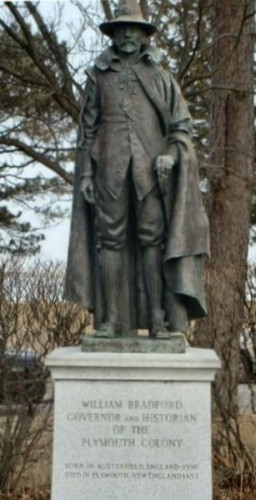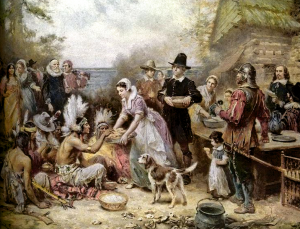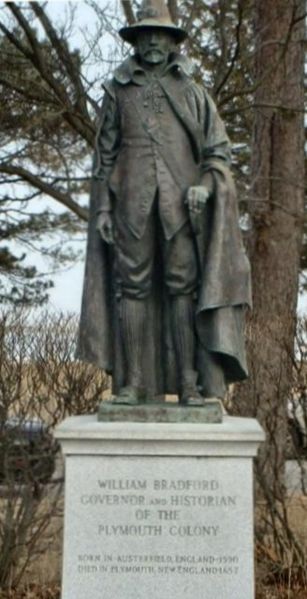
Today people associate the Pilgrims of Plymouth with the image of America (like baseball and apple-pie). Little children in grade school learn about the Pilgrims as the first people to settle in America and the first Thanksgiving. However, in actuality, Plymouth was not the first colony in America, Jamestown was, and the Pilgrims of Plymouth were not our founding fathers. But lets face it folks, America (especially Massachusetts) would be nothing without those stubborn Puritans in funny hats on the Mayflower that sailed off from Plymouth, and then conveniently named whatever rock they landed on: Plymouth.
We know much about this wonderful beginning due to the extensive journal of William Bradford which was collected and published as Of Plymouth Plantation. Now, as far as I’m concerned, Puritan literature is probably the most boring thing on earth. But having to write paper on Bradford’s Plymouth slightly (only slightly) changed my mind.
William Bradford was a rebel. At the young age of twelve, he began to go to secret, nonconformist meetings, which at the time were illegal. When the group decided to make their own church, they fled to Holland to avoid persecution. They called themselves the “Separatists”(these guys aren’t very creative with names). Still, in Holland, pressure against the separatists increased, and again they fled, this time to America.
Bradford kept accounts in his journal of the journey of the Mayflower, as well as, the settling and founding of the colony of Plymouth, MA. He tells of many hardships of the journey: disease, death, and damage, which he brushes off as mere trials of God (kind of like a puritan Chuck Norris). When they land, the few that aren’t already dead find themselves cold and hungry and in Massachusetts in December. Not exactly the best situation: in fact it killed half of the settlers, including their leader, John Carver. But through everything some persevered, Bradford writing everything down as they went, just encase someone wanted to read a 30 year history of the founding of Massachusetts in their English class… just maybe.
The journal is amusing at times though, with Bradford’s input. You can tell who he likes, and who he doesn’t.

You can witness his faith (or at least faith to keep the morale up). He was the leader of the colony for thirty years, and he felt their story must be told. And he was right. Walter P Wenska, in his “Bradford’s Two Histories: Pattern and Paradigm in of Plymouth Plantation”, shows us the importance of this puritan diary in context to literature as a whole:
Scarcely twenty years after the discovery of his manuscript history in 1855 and its first publication a year later, William Bradford was acclaimed by Moses Coit Tyler as ‘the father of American history,’ a man whose account of the Plymouth settlement breathed ‘justice, breadth, vigor, dignity, directness and an untroubled command of strong and manly speech.’ Some ten years later, in 1888, Charles F. Richardson chose rather to emphasize Bradford’s importance as a ‘forerunner of literature’ and ‘a story-teller of considerable power.
With that being said, here is Bradford’s telling of the first Thanksgiving, a great American holiday started by freezing, starving men in funny hats. Happy Thanksgiving!

